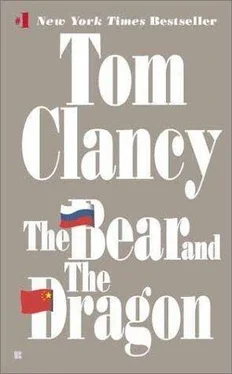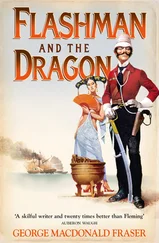Tom Clancy - The Bear and the Dragon
Здесь есть возможность читать онлайн «Tom Clancy - The Bear and the Dragon» весь текст электронной книги совершенно бесплатно (целиком полную версию без сокращений). В некоторых случаях можно слушать аудио, скачать через торрент в формате fb2 и присутствует краткое содержание. Год выпуска: 2001, ISBN: 2001, Жанр: Триллер, на английском языке. Описание произведения, (предисловие) а так же отзывы посетителей доступны на портале библиотеки ЛибКат.
- Название:The Bear and the Dragon
- Автор:
- Жанр:
- Год:2001
- ISBN:780425180969
- Рейтинг книги:3 / 5. Голосов: 1
-
Избранное:Добавить в избранное
- Отзывы:
-
Ваша оценка:
- 60
- 1
- 2
- 3
- 4
- 5
The Bear and the Dragon: краткое содержание, описание и аннотация
Предлагаем к чтению аннотацию, описание, краткое содержание или предисловие (зависит от того, что написал сам автор книги «The Bear and the Dragon»). Если вы не нашли необходимую информацию о книге — напишите в комментариях, мы постараемся отыскать её.
The Bear and the Dragon — читать онлайн бесплатно полную книгу (весь текст) целиком
Ниже представлен текст книги, разбитый по страницам. Система сохранения места последней прочитанной страницы, позволяет с удобством читать онлайн бесплатно книгу «The Bear and the Dragon», без необходимости каждый раз заново искать на чём Вы остановились. Поставьте закладку, и сможете в любой момент перейти на страницу, на которой закончили чтение.
Интервал:
Закладка:
“Yes, Comrade Chairman,” Major Shelepin said, coming in the door.
“Something new for you to worry about, Anatoliy Ivan’ch,” Golovko told him. It was more than that. The first sentence turned Shelepin pale.
It started in America with the unions. These affiliations of working people, which had lost power in the preceding decades, were in their way the most conservative organizations in America, for the simple reason that their loss of power had made them mindful of the importance of what power they retained. To hold on to that, they resisted any change that threatened the smallest entitlement of their humblest member.
China had long been a bête noir for the labor movement, for the simple reason that Chinese workers made less in a day than American union automobile workers made during their morning coffee break. That tilted the playing field in favor of the Asians, and that was something the AFL/CIO was not prepared to approve.
So much the better that the government that ruled those underpaid workers disregarded human rights. That just made them easier to oppose.
American labor unions are nothing if not organized, and so every single member of Congress started getting telephone calls. Most of them were taken by staffers, but those from senior union officials in a member’s state or district usually made it all the way through, regardless of which side the individual member stood on. Attention was called to the barbaric action of that godless state which also, by the way, shit on its workers and took American jobs through its unfair labor practices. The size of the trade surplus came up in every single telephone call, which would have made the members of Congress think that it was a carefully orchestrated phone campaign (which it was) had they compared notes on the telephone calls with one another (which they didn’t).
Later in the day, demonstrations were held, and though they were about as spontaneous as those held in the People’s Republic of China, they were covered by the local and/or national media, because it was a place to send cameras, and the newsies belonged to a union, too.
Behind the telephone calls and in front of the TV coverage of the demonstrations came the letters and e-mails, all of which were counted and cataloged by the members’ staffers.
Some of them called the White House to let the President know what was happening on the Hill. Those calls all went to the office of Arnold van Damm, whose own staff kept a careful count of the calls, their position, and their degree of passion, which was running pretty high.
On top of that came the notices from the religious communities, virtually all of which China had managed to offend at once.
The one unexpected but shrewd development of the day didn’t involve a call or letter to anyone in the government. Chinese manufacturers located on the island of Taiwan all had lobbying and public-relations agencies in America. One of these came up with an idea that caught on as rapidly as the powder inside a rifle cartridge. By midday, three separate printers were turning out peel-off stickers with the flag of the Republic of China and the caption “We’re the good guys.” By the following morning, clerks at retail outlets all over America were affixing them to items of Taiwanese manufacture. The news media found out about it even before the process had begun, and thus aided the Republic of China industrialists by letting the public know of their “them not us” campaign even before it had properly begun.
The result was that the American public was reacquainted with the fact that there were indeed two countries called China, and that only one of them killed people of the clergy and then beat up on those who tried to say a few prayers on a public street. The other one even played Little League baseball.
It wasn’t often that union leaders and the clergy both cried out so vociferously, and together they were being heard. Polling organizations scrambled to catch up, and were soon framing their questions in such a way that the answers were defined even before they were given.
The draft note arrived in the Beijing embassy early in the morning. When decrypted by an NS employee, it was shown to the embassy’s senior watch officer, who managed not to throw up and decided to awaken Ambassador Hitch at once. Half an hour later, Hitch was in the office, sleepy and crabby at being awakened two hours before his accustomed time. The content of the note wasn’t contrived to brighten his day. He was soon on the phone to Foggy Bottom.
“Yes, that’s what we want you to say,” Scott Adler told him on the secure phone.
“They’re not going to like it.”
“That doesn’t surprise me, Carl.”
“Okay, just so you know,” Hitch told the SecState.
“Carl, we do think about these things, but the President is seriously pissed about-”
“Scott, I live here, y’know? I know what happened.”
“What are they going to do?” EAGLE asked.
“Before or after they take my head off?” Hitch asked in return. “They’ll tell me where to stick this note-a little more formally, of course.”
“Well, make it clear to them that the American people demand some sort of amends. And that killing diplomats cannot be done with impunity.”
“Okay, Scott. I know how to handle it. I’ll get back to you later.”
“I’ll be awake,” Adler promised, thinking of the long day in the office he was stuck with.
“See ya.” Hitch broke the connection.
CHAPTER 33 Square One
You may not talk to us this way,” Shen Tang observed. ”Minister, my country has principles which we do not violate. Some of those are respect for human rights, the right of free assembly, the right to worship God as one wishes, the right to speak freely. The government of the People’s Republic has seen fit to violate those principles, hence America’s response. Every other great power in the world recognizes those rights. China must as well.”
“Must? You tell us what we must do?”
“Minister, if China wishes to be a member of the community of nations, then, yes.”
“America will not dictate to us. You are not the rulers of the world!”
“We do not claim to be. But we can choose those nations with whom we have normal relations, and we would prefer them to recognize human rights as do all other civilized nations.”
“Now you say we are uncivilized?” Shen demanded.
“I did not say that, Minister,” Hitch responded, wishing he’d not let his tongue slip.
“America does not have the right to impose its wishes on us or any other nation. You come here and dictate trade terms to us, and now also you demand that we conduct our internal affairs so as to suit you. Enough! We will not kowtow to you. We are not your servants. I reject this note.” Shen even tossed it back in Hitch’s direction to give further emphasis to his words.
“That is your reply, then?” Hitch asked.
“That is the reply of the People’s Republic of China,” Shen answered imperiously.
“Very well, Minister. Thank you for the audience.” Hitch bowed politely and withdrew. Remarkable, he thought, that normal-if not exactly friendly-relations could come unglued this fast. Only six weeks before, Shen had been over to the embassy for a cordial working dinner, and they’d toasted each other’s country in the friendliest manner possible. But Kissinger had said it: Countries do not have friends; they have interests. And the PRC had just shit on some of America’s most closely felt principles. And that was that. He walked back out to his car for the drive to the embassy.
Cliff Rutledge was waiting there. Hitch waved him into his private office.
Читать дальшеИнтервал:
Закладка:
Похожие книги на «The Bear and the Dragon»
Представляем Вашему вниманию похожие книги на «The Bear and the Dragon» списком для выбора. Мы отобрали схожую по названию и смыслу литературу в надежде предоставить читателям больше вариантов отыскать новые, интересные, ещё непрочитанные произведения.
Обсуждение, отзывы о книге «The Bear and the Dragon» и просто собственные мнения читателей. Оставьте ваши комментарии, напишите, что Вы думаете о произведении, его смысле или главных героях. Укажите что конкретно понравилось, а что нет, и почему Вы так считаете.






![Александр Ирвин - Tom Clancy’s The Division 2. Фальшивый рассвет [litres]](/books/417744/aleksandr-irvin-tom-clancy-s-the-division-2-falsh-thumb.webp)




